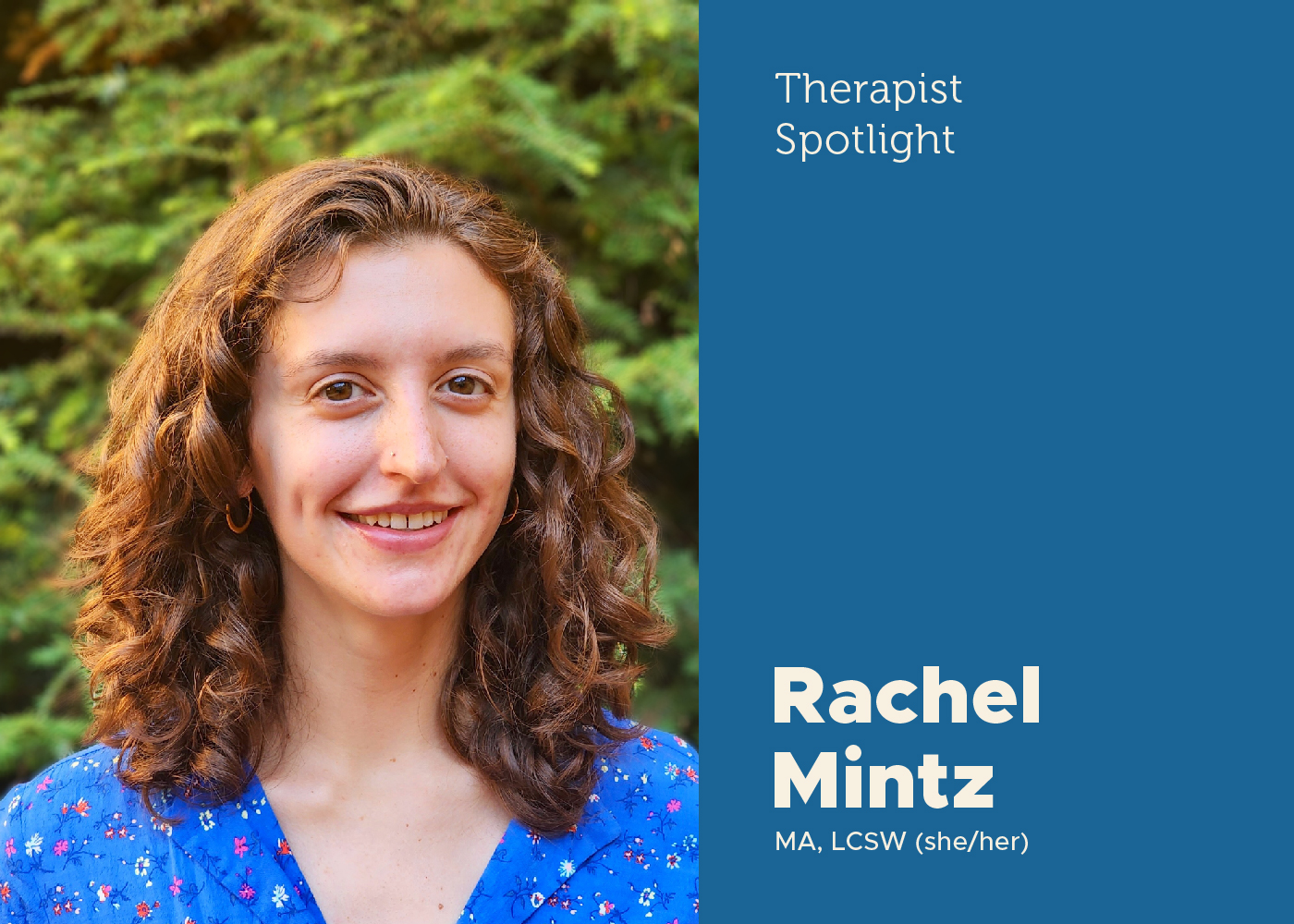
Rachel (she/her) is a psychotherapist at Wildflower. Her therapeutic approach is holistic, relational, and informed by feminist and queer theory. At Wildflower, her work focuses on those who have concerns around sex, intimacy, fertility, or motherhood, people who have experienced trauma, and people with mood disorders. She received her Bachelor’s degree in Anthropology from Colorado College, with minors in Feminist & Gender Studies and Spanish Language and her Master’s degree in Social Work from the University of Chicago. During this time, she conducted research both on intimate partner violence connected to the military and abortion rhetoric in Quito, Ecuador, and worked with teens and adults experiencing homelessness. Read Rachel’s full bio here.
What inspired you to pursue a career as a psychotherapist?
Since I was young, I’ve been fascinated by people. I wanted to know why people behaved and felt the way that they did, what motivated them, and what could improve their well-being. I also loved to help, whether that was by staying late in elementary school to put up decorations in the classroom, or providing a listening ear to my friends and family. Psychotherapy seemed like the perfect way to blend these two interests.
As a psychotherapist, what part of your job is most satisfying?
There are lots of parts of this job that are satisfying, but the one that sticks out the most is when a client feels they have achieved the goals they set at the start of therapy. Hearing the client reflect upon their experience, how they’ve grown, how proud they are of themselves, and their plans for the future, leaves me feeling satisfied, honored, and privileged to be doing this work.
How would you describe your therapeutic approach?
My therapeutic approach is holistic, relational, and informed by feminist and queer theory. I consider the multitude of factors impacting clients’ lives, including physical health, family history, and systemic oppression (to name a few). It is my goal to create a strong, warm, trusting therapeutic relationship with each one of my clients, and I personalize the care I provide to address each client’s unique circumstances.
Why do you believe that psychotherapy can help?
Psychotherapy is a unique space in which clients can share their experience without judgment and without the interference of someone else’s agenda. Outside of therapy, most folks we speak to have a preference for how we act, address a situation, etc. Given the professional nature of the therapeutic relationship, therapists do not have any “skin in the game” of your life–we just want you to do what’s best for you and believe that only you truly know what that is. This is why I believe psychotherapy can help: it is a one-of-a-kind space in which you can explore the various parts of yourself, learn about your wants and needs, and make decisions based on this new knowledge.
What are some of your specialties and what drew you to them?
In terms of issues I address, my specialties include sexual violence, intimacy concerns, and anxiety. I was drawn to working with survivors of sexual violence through my passions for social justice and nonviolence, as well as research and training opportunities throughout my education. While working at a rape crisis center, I became deeply interested in working with folks who have concerns around sexual intimacy more generally and found knowledge in this area to be useful to survivors of sexual violence. I also specialize in anxiety, which was an issue that I learned I had a knack for and find deeply rewarding.
When it comes to therapeutic modalities, I utilize Acceptance and Commitment Therapy (ACT), Cognitive Behavioral Therapy (CBT), mindfulness, and Eye Movement Desensitization and Reprocessing (EMDR). I appreciate how ACT, CBT, and mindfulness focus on the here-and-now, which can have a profound, positive effect on our mental health. I find EMDR useful for addressing deep-seated experiences on which we seem to get stuck.

What is one thing about psychotherapy you wish everyone knew?
Psychotherapy involves hard work and takes time. When we seek to change our behavior, we often must undo years––maybe decades––of learned behavior or trauma. Just like you would not expect a 30-year-old “righty” to suddenly be able to write flawlessly with their left hand, we cannot expect major psychological changes to occur in the blink of an eye.
What is your motto or personal mantra?
“Clear is kind” – Brené Brown. I whole-heartedly believe that being clear is the kindest option, and I strive to live by this every day.
What are your favorite self-care activities?
I adore spending quality time with loved ones, moving my body, being outside in nature, tending to my plants, playing guitar, and getting good sleep!

